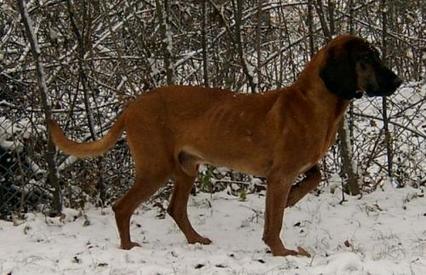
Originally bred as a light working dog in the mountainous regions of Bavaria, Germany, the Bavarian Mountain Hound principally specialised in tracking large game, such as wild boar and deer, following the trail of blood made by injury. Such a discipline derives from the Middle Ages, when hunting weaponry was far less accurate and game was often wounded but not outright killed. The Bavarian Mountain Hound was selectively crossbred in the early 19th century to fulfill the need for tracking large game, with a steady temperament, a strong sense of smell and a resilient body structure.
A medium build breed with high-set ears, an elongated head and medium-set tail, the Bavarian Mountain Hound is not commonly found in the home due to its desire for outdoor space, but is popularly owned by game wardens and foresters in need of a responsive and robust hunting companion. The Bavarian Mountain Hound does, however, have an amiable temperament, making it an affectionate and companionable dog for families. Commonly recognised in colour variations of brindle or black-masked fawn.
Despite discrepancies across gender, the breed typically weighs between 20-25 kg, with an average life expectancy of 10 years. The Bavarian Mountain Hound has a powerful hunting instinct that relies upon sharp senses and agility, notorious to the breed. Poised, agile and devoted to its family, the breed makes a great addition to the active family or to a dedicated sole owner, providing its needs for activity, enrichment and companionship are met.
With the Bavarian Mountain Hound there exists few known common health threats, whether serious or otherwise. The resilient constitution of this breed, bred into it for the purposes of tracking, translates through general good health.
Do you own a Bavarian Mountain Hound? Let others know what they're like!
Related products
Advantage 80 Spot On Flea Control Large Cats and Rabbits
from £12.95
Advantage 40 Spot On Flea Control Cats, Small Dogs and Rabbits
from £12.95
Advantage 100 Spot On Flea Control Medium Dog
from £12.95
Advantage 250 Spot On Flea Control Large Dog
from £12.95
Drontal Tasty Bone Wormer Tablets for Small & Medium Dogs (2 to 20kg)
from £2.15
FRONTLINE Plus Flea & Tick Treatment Dogs & Cats
from £17.49
TermaWorm™ Tablets for Cats & Dogs
from £1.59
Drontal Tasty Bone XL Wormer Tablets for Large Dogs (Over 20kg)
from £6.39